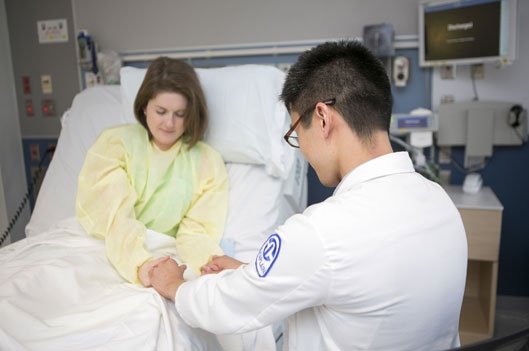(Chicago) The Training Research-Literate Chaplains as Ambassadors for Spirituality and Health program announced the selection of its first cohort of chaplain research fellows and of the first recipients of the program’s clinical pastoral education curriculum development grants. The fellowships and grants are part of Training Research-Literate Chaplains’ efforts to advance knowledge about religion and health in health care organizations and among the public.
The Training Research-Literate Chaplains program is a joint effort by the Department of Health, Religion and Human Values at Rush University Medical Center in Chicago and the Department of Sociology at Brandeis University in Waltham, Massachusetts. The project seeks to close the gap between hospital chaplains’ current limited research literacy and the importance of evidence-based care for all members of the health care team.
“Health care chaplains have embraced the importance of evidence-based practice but lack the training to realize it,” said program co-leader George Fitchett, DMin, PhD, professor and director of research in the Rush Department of Religion, Health and Human Values. “More interdisciplinary collaboration and a growing understanding of how religion and spirituality can positively affect patient health means hospital chaplains are increasingly important members of a patient’s care team.”
The fellowships will pay for 16 board-certified chaplains to complete a two-year, research-focused Master of Science or Master of Public Health degree in epidemiology, biostatistics or public health at an accredited school of public health. Selected from among a competitive pool, the first cohort of eight fellows are gathering for a kickoff conference from July 27 to 29 at Rush. The conference will bring together the fellows and members of the Training Research-Literate Chaplains’ leadership and advisory committees to open the conversations on chaplaincy research.
The clinical pastoral education (CPE) grants will be given to 70 CPE programs – which provide the training required to be a hospital chaplain — to incorporate research literacy into their curricula. The first cohort consists of 38 centers and will reach 237 student health care chaplains.
The Training Research-Literate Chaplains’ third initiative, a free, online education for chaplains entitled “Religion, Spirituality and Health: An Introduction to Research,” will be made available in 2017 at no cost to practicing chaplains who are members of the supporting professional chaplaincy organizations.
“We are thrilled with the opportunities this program is offering to chaplains with a range of backgrounds and experiences,” said Wendy Cadge, PhD, program co-leader and professor of sociology at Brandeis. “The first group of fellows and CPE centers will do much to bridge the gaps between chaplains and other members of the healthcare team. We are grateful to the John Templeton Foundation and the sponsoring chaplaincy organizations for giving all of us this opportunity.”
The Training Research-Literate Chaplains program is funded by $4.5 million in grants from the John Templeton Foundation with additional support from the Association of Professional Chaplains, the Association of Clinical Pastoral Education, the National Association of Catholic Chaplains, and Neshama – Association of Jewish Chaplains.
The first cohort of chaplain research fellows includes the following members:
- Rev. Marilyn J.D. Barnes, MA, BCC, senior staff chaplain, Advocate Lutheran General Hospital, Park Ridge, Illinois
- Rev. John Michael Betz, MDiv, BCC, CT, staff chaplain, Hospice of Hope, Maysville, Kentucky, and chaplain (Captain), U.S. Army Reserve
- Allison DeLaney, MA, BCC, PT, chaplain and bereavement coordinator, Hospice House and Support Care of Williamsburg, Williamsburg, Virginia
- Tim Ford, MA, MS, chaplain liaison and clinical instructor, Department of Patient Counseling, Virginia Commonwealth University School of Allied Health Sciences, Richmond, Virginia
- Rev. Patricia K. Palmer, MDiv, BCC, spiritual health oncology fellow, Emory University, Atlanta, Georgia
- Rev. Geila Rajaee, MDiv, BCC, manager, Mount Carmel Health System, Columbus, Ohio
- Beba Tata, MDiv, MS, BCC, staff chaplain, Mayo Clinic, Rochester, Minnesota
- Rev. Kelsey White, MDiv, BCC, staff chaplain, Norton Healthcare, Louisville, Kentucky
The CPE programs at the following institutions are the recipients of the first round of clinical pastoral education grants:
- Advocate Health Care, Downers Grove, Illinois
- Baptist Health Little Rock, Little Rock, Arkansas
- Care and Counseling Center of Georgia, Decatur, Georgia
- Carolinas Healthcare System, Charlotte and Concord, North Carolina
- Cedars-Sinai Medical Center, Los Angeles, California
- Duke University Hospital, Durham, North Carolina
- Florida Hospital Division, Orlando, Florida
- Gundersen Health System, LaCrosse, Wisconsin
- Iliff School of Theology, Denver, Colorado
- Louis Stokes Cleveland VA Medical Center, Cleveland, Ohio
- Lutheran Services New York Alliance, New York, New York
- Mercy St Vincent Medical Center, Toledo, Ohio
- Mt Sinai Health System, New York, New York
- Norton Healthcare, Louisville, Kentucky
- Pine Rest Christian Mental Health Services, Grand Rapids, Michigan
- Parkland Health and Hospital System, Dallas, Texas
- St. Joseph Mercy Health System, Ann Arbor, Michigan
- Tampa General Hospital, Tampa, Florida
- UCSF Medical Center and UCSF Benioff Children’s Hospital, San Francisco, California
- University of Rochester Medical Center, Rochester, New York
- Wake Forest Baptist Medical Center, Winston-Salem, North Carolina
- White Memorial Medical Center, Los Angeles, California
- Yale New Haven Hospital, New Haven, Connecticut
For more information about the Training Research-Literate Chaplains as Ambassadors for Spirituality and Health program, please contact kathryn_lyndes@rush.edu. For media inquiries, please contact kevin_mckeough@rush.edu.

